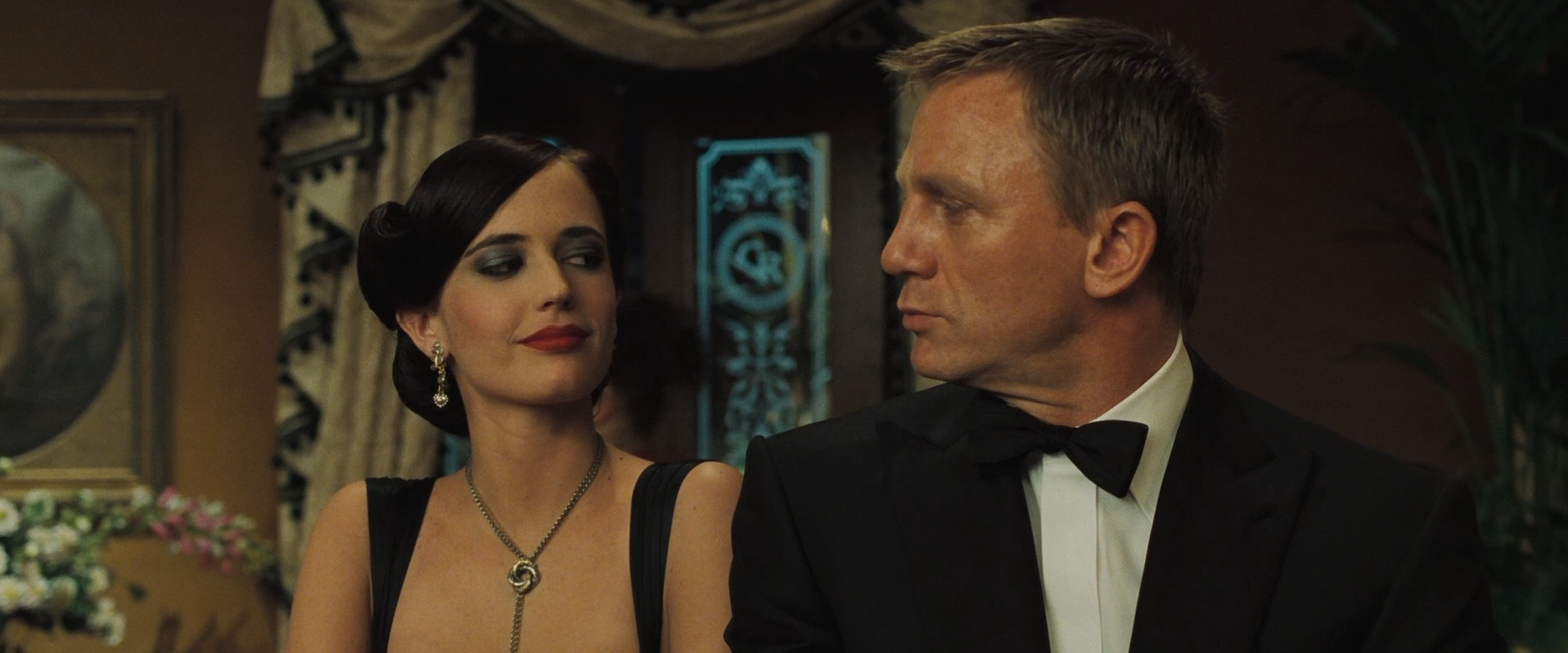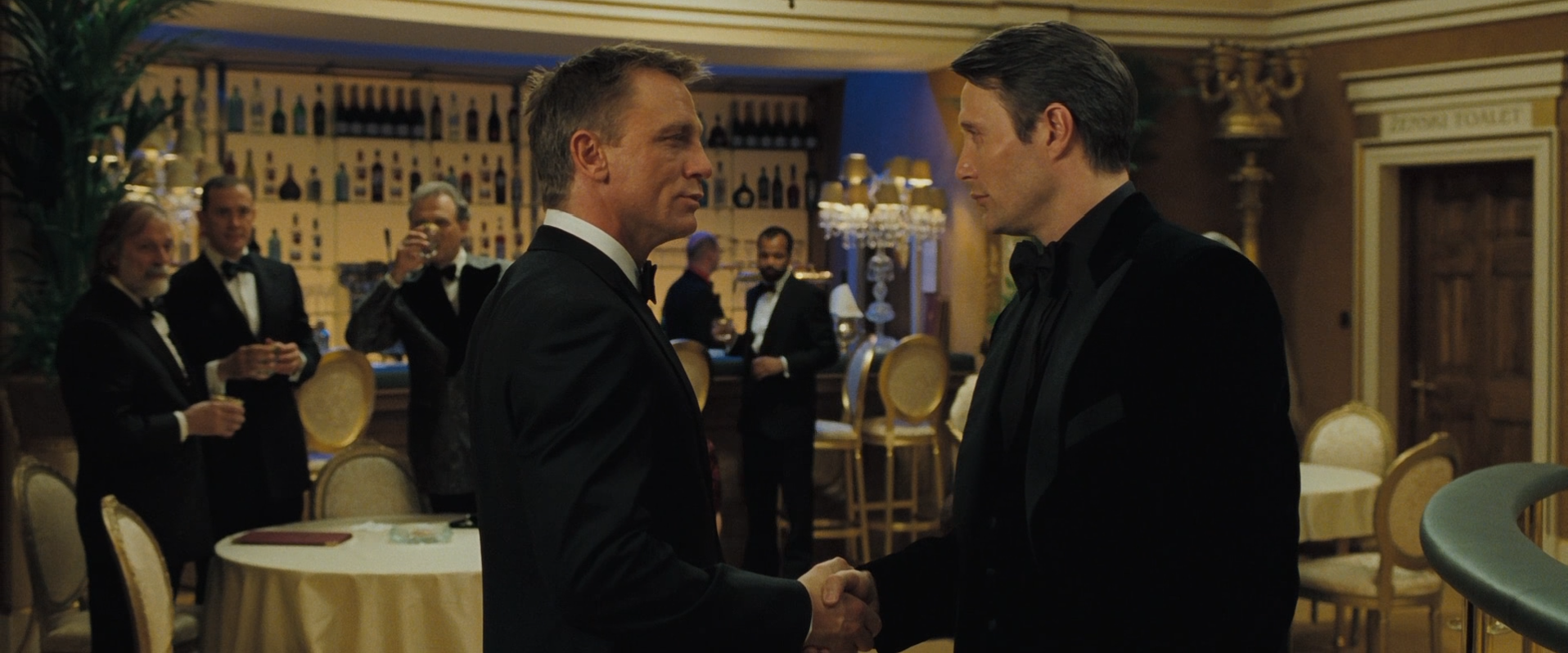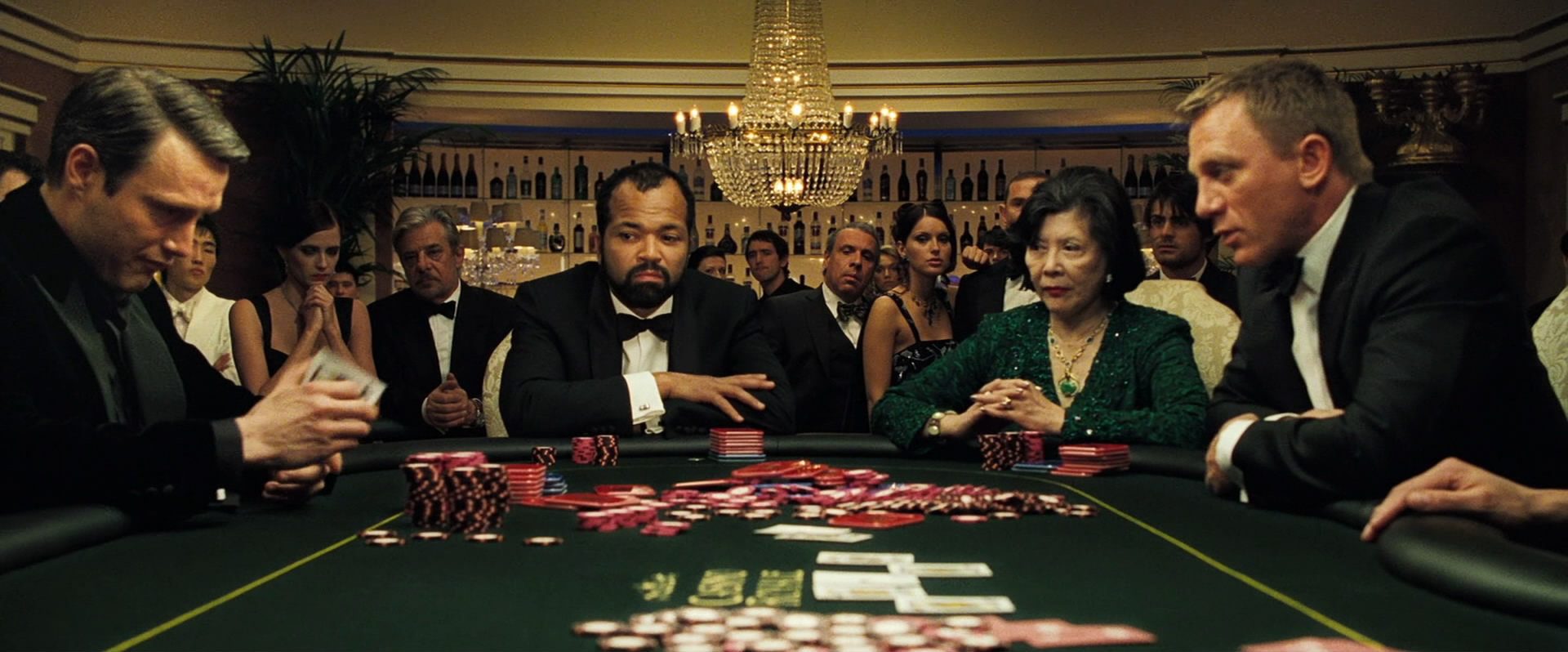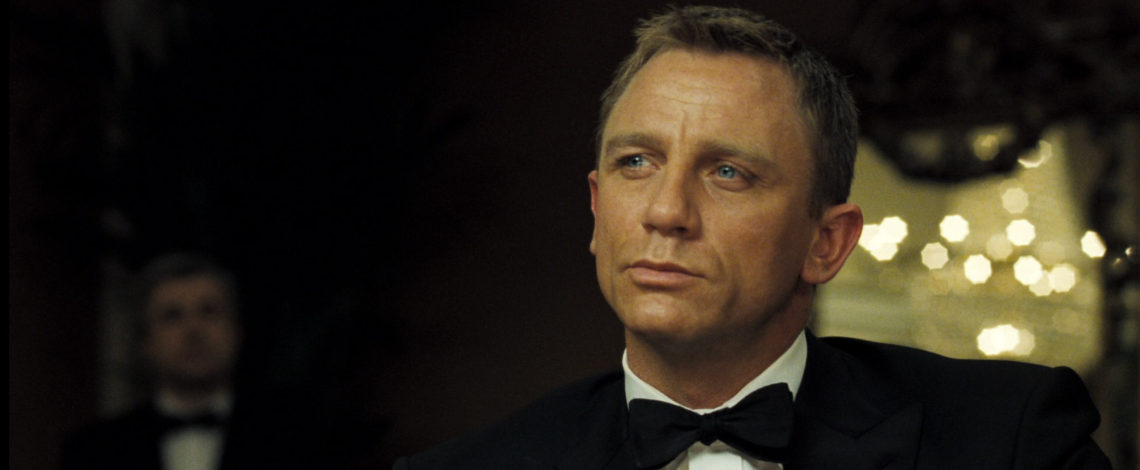“Do I look like I give a damn?” James Bond is world weary, in a more literal way than previously. The fifty-plus year old character has faced the changing tides of different social, political, economic, and, certainly, ideological movements and waves and phases throughout his entire career. Or, rather, he has encountered them. Too easily, James Bond and his creators have been content with Bond brushing up against these changes, rarely allowing them to affect him. They people around him are explicitly and otherwise affected, but he has always deflected, sidestepped, or circumnavigated, or paid lip service to the transition from one sociocultural issue to the next, be it gender equality or HIV/AIDS, or even the fall of the Civil Rights movement in the United States. There are two exceptions, and they would be both directed by the same person. The first was GoldenEye (1995), which was as far as Bond reached in terms of contesting reality, which is not totally unfair given that the character, and his situations, have always been the stuff of fantasy. The other was Casino Royale.
In it, we see for the first time, visibly and palpably, the weight the ever-changing world has had on Agent 007. His face is rugged, even crude in its bone structure; his skin bloodied and dirtied by sweat and oil; his emotional and mental well-being all but hanging by a string. He’s yet to become the numbed pawn of the British Secret Service.
What was Pierce Brosnan’s James Bond if not a very pat answer to the Royal Shakespeare Company-informed pathos of Timothy Dalton’s? His Bond also lived through the HIV/AIDS crisis, the War on Drugs, and other international issues that, implicitly or otherwise, not only shaped Dalton’s portrayal but also the experience of watching him on screen. But audiences and critics didn’t take to that 007, and though Dalton had planned to return after 1989’s Licence to Kill, the mix of rights issues and other studio nonsense eventually reached an endpoint for Dalton and the 30-plus-year franchise.
Another day, another Bond. Brosnan’s only daring entry into the series was his first, GoldenEye, which seemed like the only film genuinely scared of the sociopolitical climate it was responding to. Post-Cold War tensions, a new wave of feminism, and the threat that Bond didn’t really have a place in contemporary culture.
James Bond, created by Ian Fleming in 1953 in the novel Casino Royale and adapted to the screen by producers Albert R. “Cubby” Broccoli and Harry Saltzman in 1962 in Dr. No, is one of the few franchise figures that has a) lasted as long as it has and b) uses every film as an attempt to justify its own existence. Brosnan’s following films from 1997 to 2002 struggled to do that, at least on a critical level, earning some of the worst reviews of the franchise’s history (remember the invisible Aston Martin in Die Another Day?). Tomorrow Never Dies (1997) touched on the changing media landscape, The World is Not Enough (1999) examined neo-nuclear threats, and I’m not sure what Die Another Day was supposed to do. If the shakeup at MGM and EON Productions (which is the primary production company responsible for the Bond films) is to suggest anything, neither did they.

What’s funny about Die Another Day is perhaps its very nothingness: Released in the winter of 2002, it’s technically the first Bond film that’s “post-9/11”, but it doesn’t feel like it. Even its play with the impending threat of North Korea feels lost in time, not exactly devoid of contextual specificity, but almost trapped in a storyline that would have been better suited a couple decades prior. So, Die Another Day does not really justify why that agent with the license to kill is still on screen in the first place.
Which brings us to the second longest gap between Bond films, both caused by very similar reasons. Six years had passed between Licence to Kill and GoldenEye, and four years between Die Another Day and Casino Royale in 2006. The average time between Bond films is usually two to three. And like the previous occurrence, it was a matter of direction and changing times. How should James Bond respond to the climate of the last decade? GoldenEye is technically a “softer” film than License to Kill, and if diamonds and DNA replacement wasn’t the answer for Die Another Day (which is similarly “soft”), then why not go the other direction?
Enter Daniel Craig, whose experience with the Royal National Theater makes him comparable to Dalton and gives him the chops to allow a now well-worn cliché to really deliver: he brought James Bond into the 21st century.
The job of every Bond actor, certainly, is to bring that character into whatever sociopolitical and cultural atmosphere that is contemporary. But what does that mean for this film in particular? Casino Royale has its roots as a pulpy spy novel, with hues of exploitation, and whose main villain’s plan – to bankrupt Le Chiffre, the head of a terrorist organization – feels only tenuously connected to a modern world.
But there’s the key word: terrorist. In the time since Casino Royale was published, nearly five decades prior, that word has grown and mutated, and it’s evident in the film, directed by Martin Campbell, who also did GoldenEye. The reason why Casino Royale feels less immediate now, at least on first glance, is because of its abstraction of the villain. Le Chiffre is diabolical in comparably uninteresting ways, his villainy more sinister than blatant. That’s translated on the screen by keeping intact the abstract nature of Le Chiffre’s motives, even his purpose.
While many Bond villains have dealt in unseemly plots to rule the world, they’ve never been abstract; they’ve relegated themselves to joyful contrivances. But to bring James Bond into the 21st century means that James Bond, and the audience, too, must confront the abstractions of terrorism.
In one scene, M (Judi Dench) walks down the halls of MI6, complaining of the mess James Bond has made chasing after someone with terrorist connections in Uganda. She spits out, “Christ, I miss the Cold War.” The irony is that both the War on Terrorism and the Cold War deal in semantics, complexities in agency and autonomy. But the difference is that confrontation in the Cold War was, comparably, private. The fury M feels shortly after Bond fucks up in Uganda is because he tries to make the malleable into something permanent and tangible. His inability to focus on the big picture is a flaw, and a human one at that.

To show Bond with flaws, ideological, emotional, and visceral, seems symptomatic of post-9/11 masculinity. More films, especially ones that deal explicitly with the aftermath of 9/11 in various forms, seem to examine the changes in presentation and performance of masculinity, and the cracks in that performance. Films like In the Valley of Elah, American Sniper, and Extremely Loud and Incredibly Close paint either blunt critiques on heteromasculinity (particularly of an American brand tied to American Exceptionalism) or a new breed of masculinity that allows itself a new, even radical embracement of sensitivity.
The baggage of James Bond the character is inextricable from Casino Royale, and from the subsequent films in the Craig Cycle. There’s enough to infer that his Bond is as much of a creation of post-Cold War mentality and masculinity as much as Bond himself was a creation of post-WWI masculinity. Such inferences come up later in Craig’s films, but Martin Campbell and the screenwriters’ (Neal Purvis, Robert Wade, and Academy Award-winning Paul Haggis) greatest strength in the film is presenting the shell of a “man” upfront and cracking away at it moment by moment. Not only do you get to see Bond’s deep flaws in multiple contexts (his ego brings him down several times), you experience a rawness that was, at the time, a virtual first in the Bond series.
Bond isn’t merely a government weapon with a heart – his heart still beats, and his entire construction of identity is both destroyed and formed in the same film. Casino Royale is a film where James Bond does not win; he fucks up and makes mistakes throughout its entirety; the ideal man that audiences came to worship over the course of 40ish years is not the man you thought he was. His impulsivity, which was once a trademark quality of his ingenuity, is often his downfall in the film, from the opening parkour sequence to an incredibly egotistical bet in the game of Texas Hold ‘Em.
What could be argued to have happened to Bond is that he was, in a word, queered. Not that Bond hasn’t engendered queer and camp readings in the past, but that the creators and studios were willingly complicit in this new double-o. So often he oscillates between the hero and the other, often in the same moment. Le Chiffre’s (Mad Mikkelsen) confrontation of Bond is perhaps most exemplary of this: 007 is naked, tied to a wicker chair with the seat cut out, leaving his genitals exposed. His hands and feet are tied, bringing to mind photos of other torture victims post-9/11. The body we once ogled much earlier in the film, coming out of the sea in baby blue swim trunks inverting the iconic scene of Ursula Andress making her entrance in Dr. No, has now been made foreign to us. You don’t just do that to any hero, and even when that happens to heroic figures in film, they’re still given a sense of “dignity.” Le Chiffre has but a rudimentary torture device: a rope with a large knot tied at the end of it. Le Chiiffre is smug: Bond has been captured in his presence. He comments on the perfection of Bond’s body, now nearly ruinous. He says, “Of course, it’s not only the immediate agony, but the knowledge that if you do not yield soon enough, there will be little left to identify you as a man.” It’s a queerer, more S&M infused edition of the laser torture in 1964’s Goldfinger. If we assign hetero white men dignity partially based on their ability to maintain sexual autonomy, this scene destroys that concept.

And in this scene, Bond uses queerness as a weapon. After repeated whippings, he can’t help but laugh. He taunts Le Chiffre, snickering, “Now the whole world’s gonna know that you died scratching my balls.” Maleness in its bodily form is at once queered and weaponized in mere seconds.
So, too, is Bond’s bleeding heart a kind of queerness. Bond never really felt before, and why should he now? The shape and form of masculinity after the events of 9/11 are artifice, and the depictions of post-9/11 masculinity are intent on revealing that artifice. It’s a kind of toxicity that has been amplified to the degree that it reveals its facile nature. Vesper Lynd (Eva Green) is more than an intellectual match to 007, she’s almost a foil. She derives as much masculine power from her wits in her professionalism as M does, as J. Halberstam posits in Female Masculinity. When Bond reads Vesper on the train, this amplifies her power. And, arguably, Lynd’s cautiousness and Bond’s recklessness suggests a switching of roles, making this 007 a subversion of the character we once knew.
That may be the thesis of Craig’s Bond films after all. To take the familiar, what was once considered normative, and to render it unfamiliar and even dangerous in its subversiveness. Even in a conceptual manner, Craig’s films, which include Quantum of Solace (2008), Skyfall (2012), and SPECTRE (20015) take the familiarity of the James Bond character and undoes it to create something else, something vaguely familiar but altogether different. The series has continued to evolve to make Bond, what he represents, and what he’s fighting against more and more abstract, even unwieldy. Terrorism ascends from the ground to the digital realm, and soon enough, in the weirdest 007 film of them all, SPECTRE, so abstruse that the series questions James Bond’s necessity and existence altogether. And Bond’s identity? It comes from brokenness after all.
9/11 changed James Bond, and how we understand James Bond, in more ways than anticipated. The revisionism acted upon in Casino Royale, and in the other Craig films, is not of idealism but of consequence. Bond, and the world around him, is being stripped away, and the remnants of Bond’s world are being eviscerated by 007 himself.

















